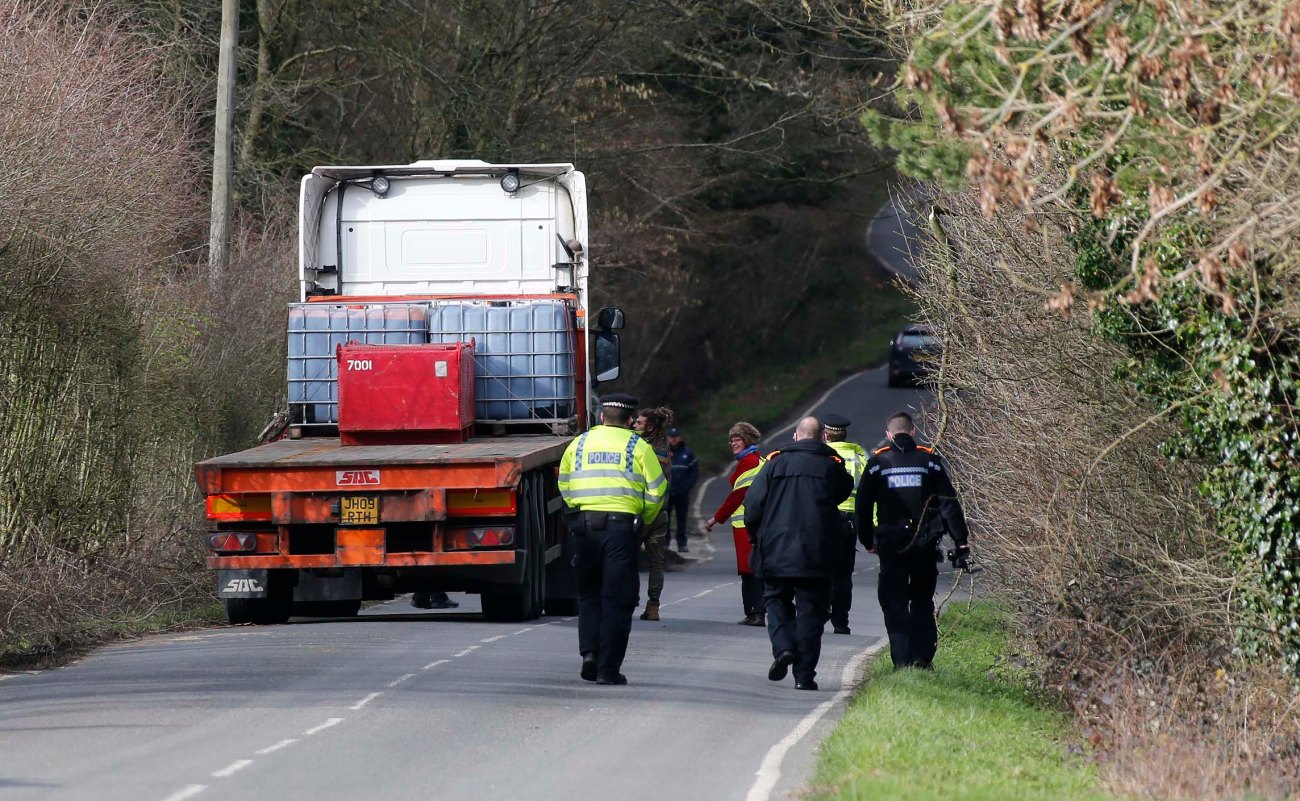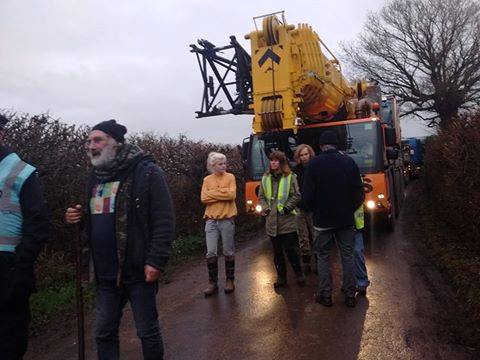
Slow walk protest by Jackie Hamlin, one of six women challenging the UKOG injunction. A case against her was dropped before it reached court. Picture: Still from video by Jon O’Houston
The exploration company, UK Oil and Gas, has defended its injunction which seeks to outlaw the protest tactic of slow walking.
The tactic, where campaigners try to delay deliveries to oil and gas sites by walking in front of lorries, is a key part of a challenge at the High Court in London.
UKOG told the court this afternoon that slow walking was an unreasonable obstruction of the highway and should be included in the injunction.
The company’s case is being challenged by six women who live near UKOG sites in Sussex and Surrey. DrillOrDrop profile of challengers
They have described the injunction as “draconian” and said it would breach their rights to peaceful protest. They were backed this afternoon by leading members of the Green Party and the campaign organisation, Friends of the Earth. DrillOrDrop report
The women have argued that some police forces facilitate slow walking protests. Where campaigners have been arrested for slow walking, some cases have been dropped and some have resulted in acquittals.

Slow walking protest at Horse Hill. Photo: Eddie Mitchell
Making the case to include slow walking in the injunction, UKOG barrister, Tim Polli QC, said:
“That the slow walking might be facilitated by the police does not make it a reasonable use of the highway.
“It is deliberately done in such a way to prevent vehicles from passing – the whole purpose is to cause an obstruction.
“The walkers do not move to the side of the road until threatened with arrest or, in some cases, until arrested. Consequently, there is a build up of traffic and queues form. Everyone who has the misfortune to be on the road is delayed.”
Mr Polli conceded that legal precedent allowed the highway to be used for protest but he said the protest must be reasonable.
“I argue that the occupation of the highway is not reasonable. Slow walking is not reasonable. The conventional rights do not make it reasonable as it is obstructive and without authority. It is therefore wrongful.”
He added:
“There is no reason why a protest has to be in the middle of the highway or take up the whole of the highway. The only reason to protest on the highway is to obstruct.”
Mr Polli said the UKOG injunction was not trying to stop protests but it was trying to stop obstruction of the company and its contractors. Of the protesters against UKOG’s operations, he said:
“If they want to stand at the side of the road and wave placards we are not trying to stop that. It is the unlawful elements of the protest that we want to stop”.
He said the challengers to the injunction argued that there should be “give and take on use of the highway for protests.
But he said:
“There is no ‘give’ from the slow-walkers; it is all ‘take’. They are not sharing the road in a reasonable and equitable way with the other vehicles.”
“Necessary and proportionate”

Photo: Simone Lister
Mr Polli said the injunction was necessary.
“There is a real and imminent threat of wrongful behaviour. To suggest to the contrary is simply unreal.”
He said work had recently started at the Horse Hill site near Gatwick Airport.
“Every time the work starts on site the protests start. When the work stops, the protests stop.”
He gave evidence of protest activity against the oil and gas industry, some of it from sites in other parts of the country.
As well as slow walking, he said UKOG was seeking to outlaw trespass, interfering with vehicles, criminal damage, obstructing gates and protests that damaged its economic interests.
He also said the injunction was proportionate:
“The order we are inviting you to make are the least interference in the article [10 and 11] rights [in the European Convention of Human Rights], which are necessary to preserve my clients rights and proportionate to do so.”
People who breach an injunction could be found to be in contempt of court and face fines, imprisonment or the seizure of their assets.
Ineos and ‘persons unknown’
The UKOG injunction is similar to one granted to the shale gas company, Ineos, in November 2017. Two environmental campaigners have been given permission to challenge that case at the Court of Appeal in March 2019.
Despite this, Mr Polli said John Male QC, the deputy judge overseeing the UKOG case, should follow the ruling in the Ineos case and grant the injunction.
Like Ineos, UKOG has taken action against ‘persons unknown’. Opponents have argued that this makes it difficult for people to know whether or not they are covered by the injunction. This is one of three parts of the Ineos injunction that will be challenged at the Court of Appeal.
But Mr Polli said:
“As things stand now it was a reasonable procedure for us.
“It completely does away with the need to produce an incredibly long list of anyone who has taken part in protests at any site, at any time, in any part of the country and visit the results of litigation upon them.
“It doesn’t force any particular individual to defend the injunction. Defendants can be self-selecting.”
He said UKOG was seeking an interim injunction. If the order caught anything that the company was not entitled to outlaw, he said it could be reviewed in the future.
The case against the injunction begins tomorrow morning (Wednesday 4 July 2018) at 10.30am. The case is expected to end on Thursday 5 July 2018.
Categories: Legal

I’m not quite sure why this is even a story. Slow walking is completely fine, as long as it isn’t done in a manner that impacts the rights of others. If you want to slow walk in your yard or in your house, there is nothing wrong with that. But protest that tramples on the rights of others is never okay. There shouldn’t even have to be an injunction to prosecute people who slow walk in an effort to destroy the livelihood of others. It is simply unlawful.
It’s also the impact upon others on the road who are delayed by such activities eg.someone may have a journey to a sick relative that is delayed. This is a totally selfish undertaking and should be stamped out.
Groan.
“It is simply unlawful”.
Incorrect. It has mainly been found in court to be LAWFUL.
This is why UKOG chose to interfere with our lawful process. A small oil company rewriting law. Would you be happy if your local coffee shop changed the law to suit their business model?
(& In this case, the business model is too accelerate dangerous climate change.)